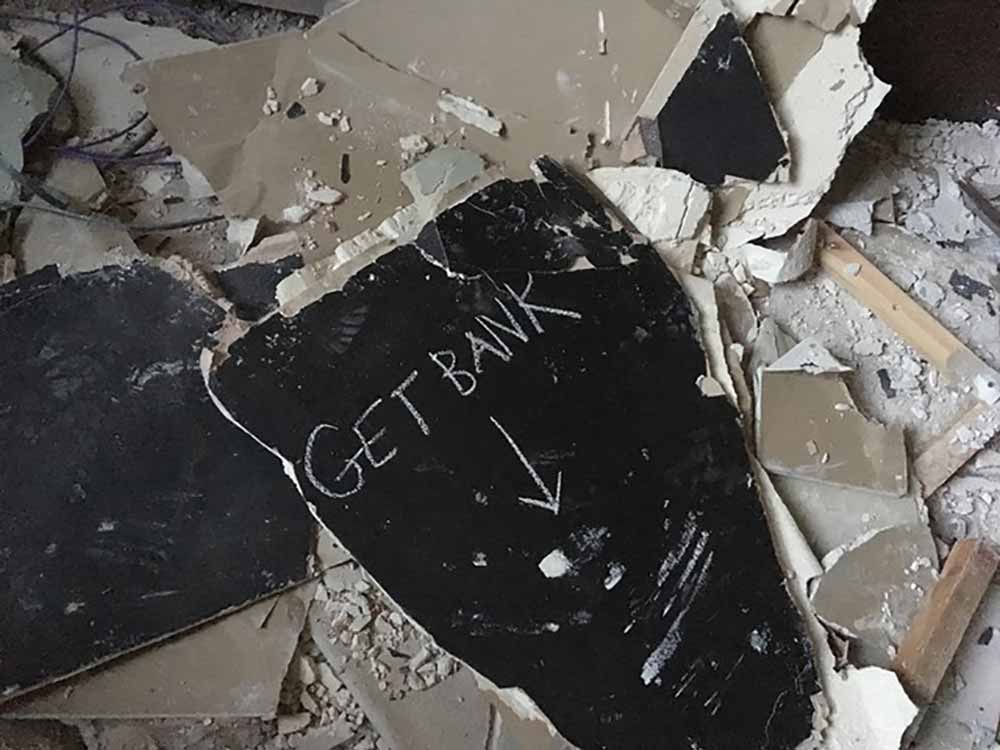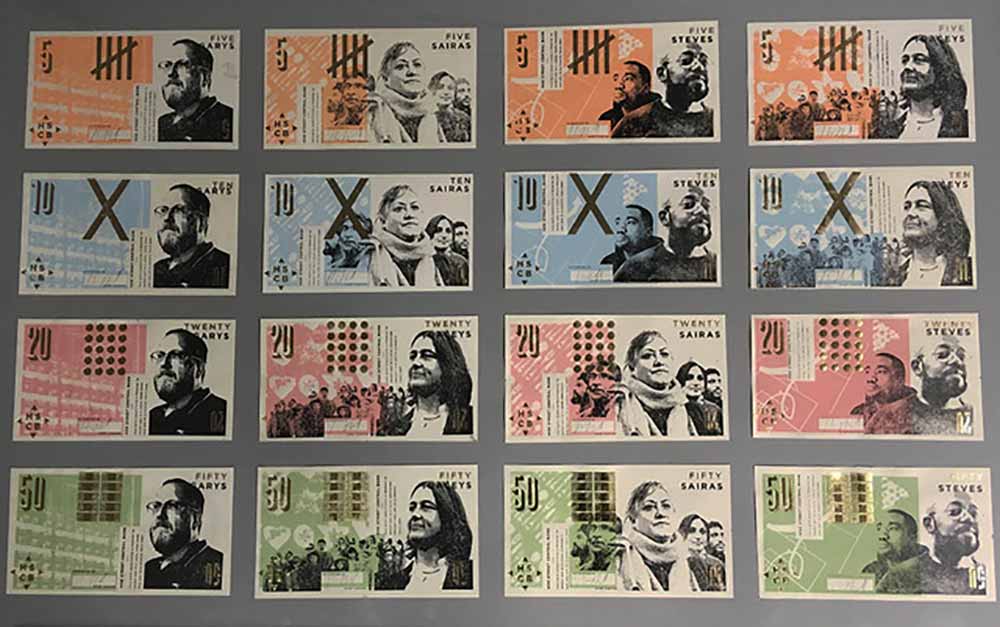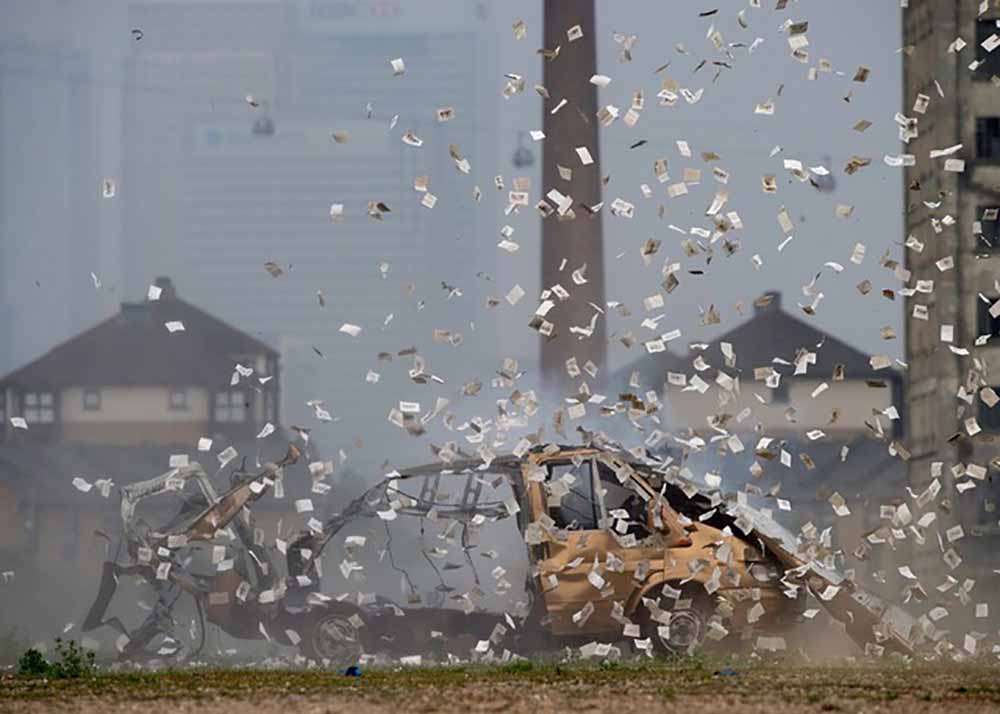- Login
Critical Spatial Practice






Debt, democracy and freedom are intricately entangled. If debt is the key tool of a neoliberal order then what do we have in our toolkit? Creativity, community, collective action, critical vision – demanding that economics be done differently and doing it ourselves and with others.
Excerpt from Hilary Powell and Dan Edelstyn, Bank Job (Chelsea Green Publishing, September 2020).
Bank Job is a project encompassing collective printmaking, feature film production, book publication, ink and explosives.
Throughout 2018–19 we operated out of a former Bank on a High Street in Walthamstow, North East London as HSCB (Hoe Street Central Bank).The Guardian called us ‘The Rebel Bank’ – as we first printed our own banknotes/artwork and sold £40,000 worth of them. We used 50% of the proceeds to fund local projects picking up the pieces of our broken financial system – local food bank ‘Eat or Heat’, homeless kitchen ‘Pl84U-Al Suffa’, youth project ‘The Soul Project’ and Barn Croft Primary School.
We used the other £20,000 to buy up and abolish £1.2m of local high interest debt. Debt gets sold for a fraction of its face value when debtors fail to make repayments. Debts get sold on and on, but debtors get chased for the full amount. The act of abolishing this debt questioned the moral arguments around debt and the injustice at the heart of the current economic system.
In May 2019 a golden Ford transit van explodes on docklands wasteland with a backdrop of the financial towers of Canary Wharf in an action called Big Bang 2. Papers fluttered through the morning air and with this act £1.2m of UK high interest debt was cancelled. The explosion was made possible by the issuing of ‘bonds’ with a return being part of this explosion and the bank kicked into action again producing coins from the exploded remains.
The project has been about making space – in the mind, on the screen, page, high street and city to open up a process of questioning received wisdom and creating and working with a new currency of ideas where art and action are media of exchange and change.
From subverting Wagner’s epic Ring Cycle for a landscape of waste and wild beauty to an erupting pop-up book history of the London Olympic site, Hilary Powell’s work involves a process of deep engagement with urban sites and their history, materials, people, poetry and politics. Her most recent collaborative Bank Job project has encompassed film, printmaking, participation, community, book-making/writing, metal casting and explosions. The work is a behind the scenes, playful, provocative tour of the ‘structures of enchantment’ that surround us, making visible and visceral hidden histories, stories and struggles. At the core of each project is a belief in and practice of ‘thinking through making’ – whether through chemical print experiments or collective roller skating. Material and meaning come together in a process of gleaning and gathering in acts of subversive salvage and an interdisciplinary, critical imagination. The pop-up book Legend: An A-Z of the Lea Valley was made through an Arts and Humanities Research Council Fellowship in the Creative and Performing Arts with the Bartlett School of Architecture, UCL mentored by Professor Jane Rendell and involving collaborations across disciplines that led to becoming Leverhulme ‘alchemist in residence’ with UCL Chemistry. Hilary is currently teaching on the MA Visual Communication at the Royal College of Art and has contributed to the MA Situated Practice and MA Architectural History at the Bartlett School of Architecture. She now begins new experiments in metal and the journeys of commodity in both South Wales tinworks and Trinity Buoy Wharf on the river Thames.
At the core of my practice is an idea of working in collaboration with a place, listening to and sounding out a kind of relay of call and response across physical and temporal boundaries.
There is a consistent empathy and solidarity with overlooked sites, materials, people and processes and an impetus to salvage, glean, assemble and illuminate the hidden in new, revealing constellations. Poetics and politics combine in varied ways and with increasing urgency. This approach has its origins in early readings of Schumacher and a world ecology, via an MA in Scenography where space was never just a backdrop to events played out in front of static, passive scenery but the event itself, through Walter Benjamin to the mentorship of Jane Rendell and Ben Campkin. Elements of montage and film theory intertwine in an understanding of space and/as time and a layered, archaeological reading of the city and its ruptures.
Thomas Kilpper. An artist cutting and splicing history and buildings who also shares another key influence in Gordon Matta-Clark.
Strike Debt/Debt Collective – their actions and movement literature from Andrew Ross’s Creditocracy and the Case for Debt Refusal 2014) to David Graeber’s Debt: The First 5000 Years (2011).
Agnes Varda, The Gleaners and I (2000). A filmic salvage operation and embrace of the overlooked and imperfect.



































































